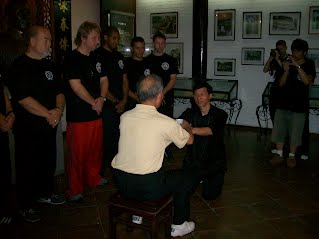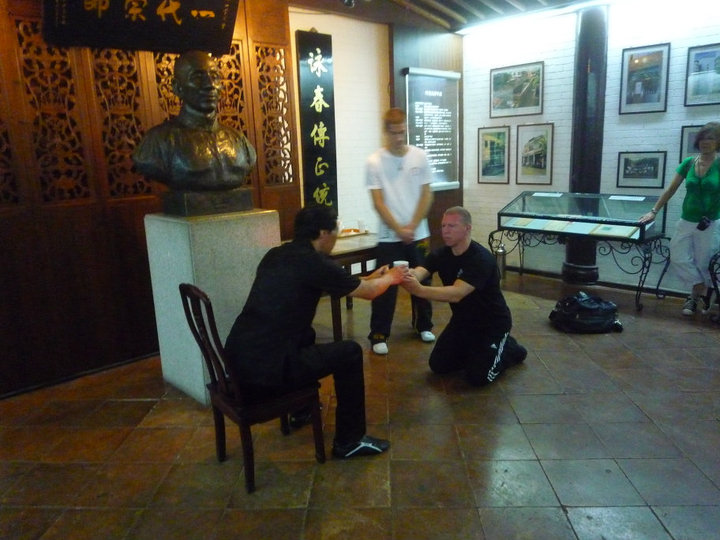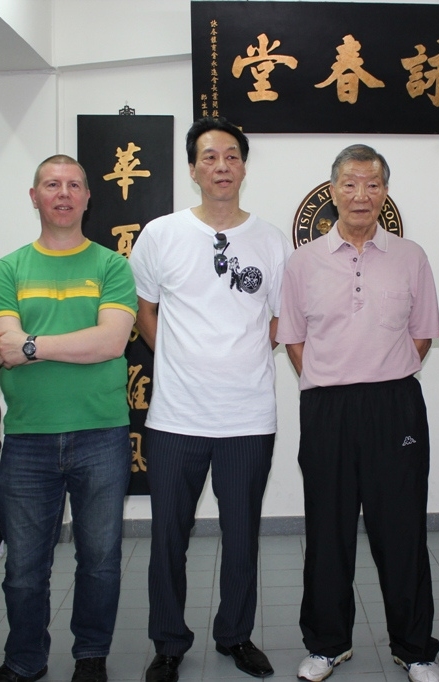Bai Si
The Master – Disciple relationship
all ancient cultures, whether Eastern or Western, the role of a teacher is very important. Teachers are considered the icons and role models of the communities they lived in. They are the elders, imbued with wisdom and virtue from much learning and experience. They initiate the younger generation into the secrets and mysteries of life.
In modern times, most of the role of the teachers and elders has been taken over by the educational system where school teachers and lecturers are paid to do their job. The traditional respect and sacredness of the elders is very diminished. Nevertheless, school teachers still command a certain level of respect.
In traditional communities, the teacher commands more respect than in urbanised and modern communities. Similarly, teachers of traditional arts command more respect.
Because of the way of life in the West, Wing Chun teachers have to ply their art in a commercial way. Students pay a certain set fee for class instructions, just like any other classes. This dilutes the respect that are due to teachers. Students think We pay you, so you have to teach us. That is the end of it. No more, no less.. This is a sad state of affairs.
In Chinese martial arts and secret lore, there is a difference between a student (shue sheng) and a disciple (tu di). This is related to the difference between a teacher (lao shi) and a master (shi fu).
A student is someone who is learning something from a teacher. While the relation is sacred, and there are mutual obligations between the student and the teacher, there is no commitment between them.
A disciple, on the other hand, has committed himself to the master, and the art of his master. The disciple has committed to entering and mastering a secret branch of knowledge and has requested the master to accept him into the arcane path. The relationship is very sacred and the obligations are binding.
Upon entering this sacred master-disciple relationship, the disciple acknowledges that the teacher is his master in the art, who he serves as the master as far as the art is concerned. This should not be misunderstood to mean “master” in the sense of a master and a slave. A sifu is not the dictator of the disciple’s life in everything. Disciples are not slaves for the master to use and abuse at every whim and fancy. The community of the master’s disciples is not a cult group.
Although it is understood that the disciples should maintain and support the master, the disciples are not expected to work as the master’s slaves to financially support the master who does no work, does not teach much, does little practice, leaches on the disciples, and even uses the disciple’s money to gamble! The disciples maintain the master who must practise hard in order to maintain and improve his skills so that he can impart them to the disciples, and he must teach them the skills he has been maintaining and improving while on the support of his disciples. It is a two-way street. It is like .We give you this money in order that you may train harder and improve your skills. In return, you teach us what you have attained.
The obligations between masters and disciples is akin to that of parents and children. As far as the art is concerned, the teacher is the master and the authority. The disciples should serve the master and maintain him in as far as promoting and propagating the art is concerned. They should provide whatever services and assistance to the master to this end. They should assist in looking after his school of martial arts, including his other students. They should help him acquire more students. They should look after his personal wellbeing and that of the school and the art. If necessary, they should help him with his livelihood . which is usually in the form of helping him in his business or school.
Disciples also have to assist in the further development of the master. For example, the master may wish to undergo further training in particular aspects of the art to attain higher levels of attainment so the disciples have to assist the master by, for example, being a training partner, or building some equipment of a room for him to engage in his secret practices. If the master is in retreat for intensive training, the disciples have to ensure he has adequate provisions, and prevent other people from entering his premises to disturb him. In turn, after the master has attained higher skills, he would teach the disciples his new insights into the art. Thus, the relationship between the master and disciple is a symbiotic one of mutual assistance. Help me master and develop this skill further so that I may teach the skill for you..
The obligation of the master is to look after the progress of the disciples on the path. After receiving students as a disciples, the disciples are the master’s children. They are his extended family. They are entitled access to him, and he has to consider their requests for inner teachings.
The word “fu” in “sifu” has different meanings when combined with other words. To understand the word “sifu”, one must understand the different connotations and implications of the word when combined with other characters.
A real “sifu” is like one’s parents in the art. They are always looking to see that we are practising properly and excel in the art, and our health and conditions in life are favourable etc. A real “sifu” is like a god-parent. When children are still young, the parents labour to bring them up. When the parents are old, the children help to take care of the parents. Similarly, when the disciple is still new in the art, the sifu” labours to ensure safety and excellence in the student so that the student may turn out to be the best in the art. When the “sifu” is old, the disciple takes care of him and his school and other students. This also teaches the disciples filial piety and how to take care of their own blood-parents. This is how the master-disciple relationship is similar to the parent-child relationship.
How is the master-student relationship approached?
A student who feels he is ready or feels he wants to become a disciple should approach the master to request to be accepted as a disciple. It may be a straight-forward question such as “Will you accept me as a disciple?” or “Can I become your disciple?”
It is up to the master to grant his consent. If he feels that the student is ready or fit to become his disciple, he may accept. If he feels that the student is not ready or is not of trustworthy character, he may reject the request. In some instances, masters will accept discipleship from rich families because the financial contributions from wealthy disciples will help maintain his livelihood so that he may still be able to teach and propagate his art to students and other disciples without charging high fees. Indeed, in the past, many masters were hired by wealthy families in China to teach martial arts to their children. There are no rules governing the acceptance of disciples. It is up to the master to decide.
If the master consents, then a discipleship ceremony will be performed. This can be as simple as presenting a “red packet” containing money to the master who is seating on a chair, and bowing 3 or 9 times to pay homage, and formally asking him to accept one as a disciple, and there after, addressing the master as “sifu”. Some masters require the ceremony to be done in front of his altar to the previous masters or the founding master, as well as that of Guan Gong, the patron of all Chinese martial arts, who the Chinese deitified as the “God of War” and “Protector of the Righteous” and “Patron of all Brotherhoods”. In the case of Wing Chun, most masters would require the ceremony to be conducted in front of an altar of Ip Man, the founder of Modern Day Wing Chun.
The student should also ask for the amount of money needed for the customary “red packet”. The amount varies according to the master and the financial standing of the student – obviously wealthy students will be charged more. Some masters charge an exorbitant amount such as USD$10,000 while some charge as little as USD$250. I know of one instance that let the student decide. Of course, what you get is what you paid for – remember this very well!!! If the student is greedy with his money, that is taken as a sign that he does not value the master’s inner teachings and so the master will similarly hold back on his teachings and gives the amount of teachings that correspond to what he perceives as the student’s value of the teaching. Besides that, the master may think the student is either not sincere in becoming a disciple or is not that committed and so he will hold back on the teachings. In other words, the disciple gets what the master thinks the disciple had placed a value on the art and the master.
Whatever, the case, it is best to give the amount that the master requested or give as much as circumstances can afford.



What to prepare for the discipleship (bai shi) ceremony?
- Red packet containing the amount of money as prescribed
- Offerings of fruits, rice, cakes and sweets, perhaps a clothing (These offerings are not only customary politeness, but signifies that the disciple.s responsibility to help maintain the master . food, clothing and shelter represent maintenance in most cultures. These offerings are offered to the master, who, in turn offers them to his preceding masters and the founder Chang San Feng so that the student gets their blessings)
- Bottle of good wine if there is an altar to Guan Gong, or if the master wishes to honour the blessings of Guan Gong as the patron saint of martial arts and enforcer of brotherhood principles, behaviour and oath.
What to do for the formal discipleship (bai shi) ceremony?
- At the appointed day and time, arrive early to wait for the master and his helpers (who also act as witnesses to the ceremony to confirm that it actually took place).
- Present the offerings of the fruits, cakes, wine to the master as offerings to the lineage masters. Do not present the red packet containing the money yet.
- (The helpers would arrange the altar, offerings, incense, and chairs as the candidate disciple does not know what to do)
- (The master would light incense to honour the founder and the lineage masters, announcing that he is about to accept a disciple, who has brought the offerings and request them to be present to witness and grant their blessings)
- The candidate disciple lights incense to honour the founder and the lineage masters. Then the candidate disciple makes 9 prostrations as mark of respect to the founder Chang San Feng and the lineage masters.
- The candidate disciple reads a petition that contains the request for discipleship and the oath of discipleship.
- The candidate disciple kneels and presents the petition to the master.
- (The master accepts)
- The candidate disciple kneels and presents the red packet containing money to the master.
- (The master accepts)
- The student is now a disciple.
What does having undergone the discipleship ceremony mean?
- One is not merely a student, but a disciple of the master.
- One is now formally included in the family . an unbroken line since the founder.
- One is considered to have entered the Fraternity.
- One is now included as the family of the master.
Being a disciple means one is part of the family, in particular, the family of the master.
The Disciple’s Obligations
- Address the master as sifu!
- Help support and maintain the master.
- Address disciples of the master who are more senior as shi xiong (male) or shi jie (female). eg. “Alan shixiong” Seniority is ranked by the date of the bai shi ceremony – not by age or date that the disciple first started training with the master.
- Disciples of the master who are more junior can be addressed by name or as shi di (male) or shi mei (female).
- Address the master’s master as shi gong (grand master).
- Address the master’s shi xiongs as shi pa (older uncle), and the master’s shi dis as shi shu (younger uncle).
- Refer to the founder as zhu shi (founder can be translated literally as ancestral master)
- Regard the master’s Wing Chun family as your family.
- Cooperate harmoniously with fellow brothers and sisters to develop yourselves, the art, the master’s art, the master’s school, and the master’s students.
- Render assistance to the master and all members of his Wing Chun family as much as you can.
- Try your best to consult the master and attend group meetings.
- Try your best to celebrate the Master’s Day (shifu dan).
- Try your best to practise and train regularly so as not to put yourself and the master into shame and disrepute.
- Do not engage in uncivil and unethical behaviour which puts yourself and the master into shame and disrepute.
- Do not hanker after all sorts of masters, paying and supporting them, while ignoring one’s master not financially supporting him, nor being present to learn from him. This is a very big mistake! The master is always waiting for the disciple to be present and to learn from him. Your disinterest in your master while pandering endlessly to other masters, thinking that you can always return to your master after you have learnt everything from other masters. Your master, after waiting for many years for you, may finally not be there to teach you when you finally realise your roaming errors. He may have other disciples to take your place (when he really needs your help, you were not only not there, but you ignored him, so why should he teach you when he no longer needs you as he is now teaching others, or has decided not to teach?), or he may have died! Read my article Misfortunes in Student-Teacher Relationships. which is based on many observations.